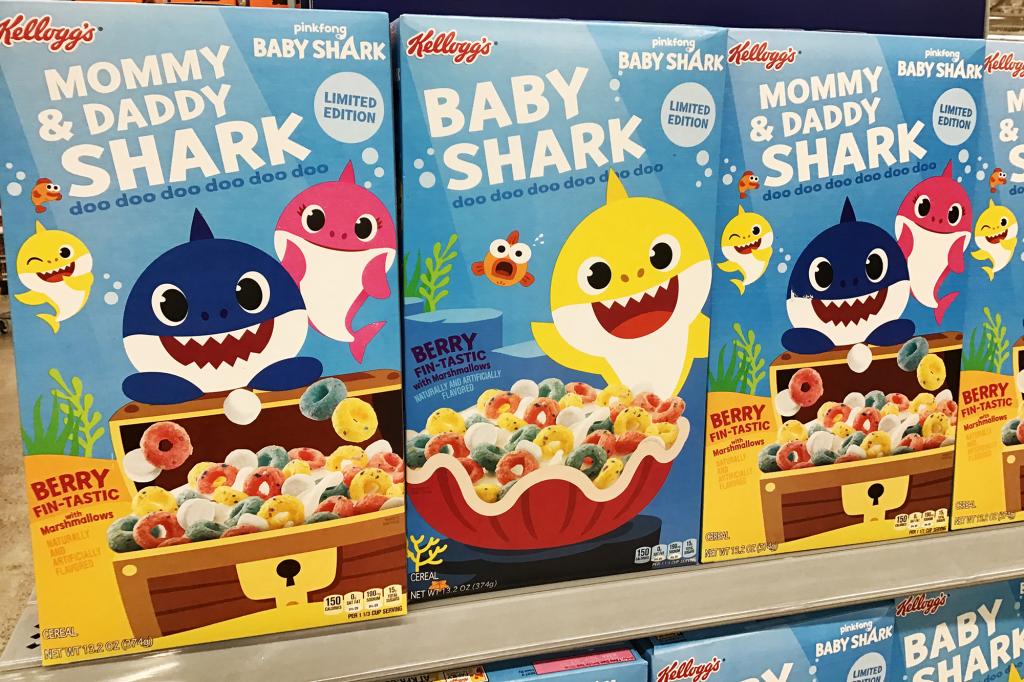Kellogg’s Froot Loops made with ‘harmful additives’ despite vow to remove dyes: shareholder
Contact The Author
Kellogg is injecting “harmful additives” in its Froot Loops sold in America that it vowed to get rid of years ago, according to an explosive letter a shareholder sent to the cereal giant reviewed by The Post.
Kellogg investor Jason Karp, founder and chief of healthy foods company HumanCo, claimed in a note sent late Wednesday that “in pursuit of short-term profits, Kellogg fills its most ubiquitous cereal products in the US…with harmful artificial dyes, such as Red 40, Yellow 6, and Blue 1, as well as the preservative BHT.”
“Kellogg knows that these artificial additives can harm children,” Karp alleged, citing research from the Center for Science in the Public Interest that said: “In addition to considerations of organ damage, cancer, birth defects, and allergic reactions, mixtures of dyes … cause hyperactivity and other behavioral problems in some children.”
“Following the science, the EU required food companies to put a warning label on products with these ingredients, stating they ‘may have an adverse effect on activity and attention in children,'” wrote Karp, who’s being represented by Quinn Emanuel attorney Alex Spiro — who also has represented Elon Musk, Jay-Z and Kanye West.
Red 40 and Yellow 5 — both of which are used to make Froot Loops in the US but not abroad — are entirely barred in the UK.
Japan also forbids the use of Red 40, and Canada bans the use of the BHT preservative, which is also an ingredient of the whole grain fruity cereal in the US.
Karp demands that “as a minimum first step, Kellogg must reinstate — and immediately deliver on — its commitment to remove artificial dyes from its products.”
Karp — whose snacking company Hu was sold to Oreo maker Mondelez in 2021 — was referring to a vow Kellogg made back in August 2015 during an earnings call with investors.
Then-North America Kellogg President Paul Norman told shareholders at the time that the company was looking to remove all artificial colors and flavors from its cereals, including its Technicolor Froot Loops, by the end of 2018.
Karp’s letter suggests otherwise, noting that the ingredients label on an American box of Froot Loops touts synthetic food dyes like Red 40 and Yellow 6 — which are made from petroleum — while the Canadian version of the cereal contains more natural dyes like concentrated carrot, watermelon and blueberry juices.
Calley Means, a former Big Food and Big Pharma lobbyist and friend of Karp’s, told The Post that “this letter opens them [Kellogg] up to litigation.”
“They were knowingly negligent,” he said of the company’s yet-to-be-fulfilled 2015 promise to stop including artificial dyes and preservatives in its products, which Means added are “leading to pre-diabetes rates among adults, teens being obese and high schoolers have mental health disorders.”
“Kellogg quickly reformulated its overseas products with less toxic ingredients. But shockingly and despite their pledge, Kellogg keeps these harmful additives in the US version of the same cereals. Even worse, Kellogg has continually introduced new cereals containing these dyes, such as the Baby Shark cereal targeted at toddlers,” Karp alleges.
It wasn’t immediately clear how many shares of Kellogg Karp owns.
All the while, Kellogg CEO Gary Pilnick has been pushing the company’s “cereal for dinner” initiative.
Pilnick boasted in an interview with CNBC last month that “the cereal category has always been quite affordable, and it tends to be a great destination when consumers are under pressure.”
“If you think about the cost of cereal for a family versus what they might otherwise do, that’s going to be much more affordable,” Pilnick added, failing to mention the nutritional ramifications of choosing a bowl of cereal and milk over meat and potatoes for the final meal of the day.
The comments outraged cost-strapped consumers, noting that it was “sad” to “live in a world where families have to choose cereal for dinner to save money.” Others, meanwhile, based the cereal-for-dinner concept as “garbage” for its poor nutritional value.
One serving of Froot Loops, for example, about one and one-third cup, contains 150 calories and a measly 2 grams of sugar, as well as a belly-busting 34 grams of carbs and 12 grams of sugar — all of which are “added sugars,” which are not found naturally in foods and are included during the processing stage.
For reference, the American Heart Association recommends that children and adult women limit their added sugar consumption to no more than 25 grams per day, while adult males should keep their intake below 36 grams.
Karp’s allegation comes the same week California lawmaker Jesse Gabriel introduced new legislation to ban artificial dyes in food items sold in school cafeterias — putting kid favorites like Lucky Charms, Gatorade, Skittles and more on the chopping block.
The Food and Drug Administration says color additives when used according to its regulations are safe for consumption and that no causal link has been established between the chemicals and behavioral effects in children.
“The totality of scientific evidence indicates that most children have no adverse effects when consuming foods containing color additives, but some evidence suggests that certain children may be sensitive to them,” the FDA stated in a question-and-answer post on its site published in December.
The Post has sought comment from Kellogg.







